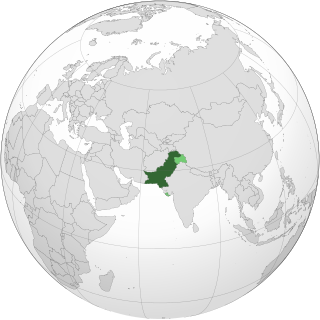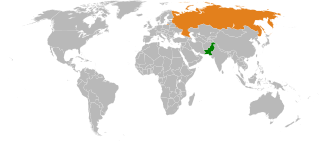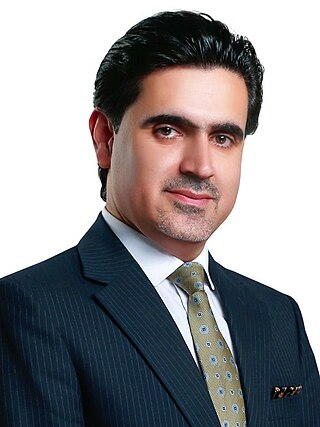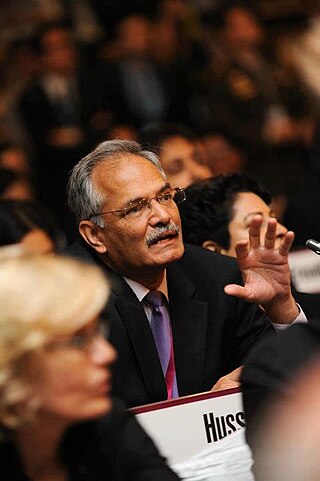Related Research Articles

The Pakistan Armed Forces are the military forces of Pakistan. It is the world's sixth-largest military measured by active military personnel and consist of three formally uniformed services—the Army, Navy, and the Air Force, which are backed by several paramilitary forces such as the National Guard and the Civil Armed Forces. A critical component to the armed forces' structure is the Strategic Plans Division Force, which is responsible for the maintenance and safeguarding of Pakistan's tactical and strategic nuclear weapons stockpile and assets. The President of Pakistan is the Commander-in-Chief of the Pakistan Armed Forces and the chain of command is organized under the Chairman of the Joint Chiefs of Staff Committee (JCSC) alongside the respective Chiefs of staffs of the Army, Navy, and Air Force. All branches are systemically coordinated during joint operations and missions under the Joint Staff Headquarters (JSHQ).

The Islamic Republic of Pakistan maintains a large network of diplomatic relations across the world. Pakistan is the second largest Muslim-majority country in terms of population and is the only Muslim majority nation to have possession of nuclear weapons.

Pakistan is one of nine states that possess nuclear weapons. Pakistan began developing nuclear weapons in January 1972 under Prime Minister Zulfikar Ali Bhutto, who delegated the program to the Chairman of the Pakistan Atomic Energy Commission (PAEC) Munir Ahmad Khan with a commitment to having the device ready by the end of 1976. Since PAEC, which consisted of over twenty laboratories and projects under reactor physicist Munir Ahmad Khan, was falling behind schedule and having considerable difficulty producing fissile material, Abdul Qadeer Khan, a metallurgist working on centrifuge enrichment for Urenco, joined the program at the behest of the Bhutto administration by the end of 1974. As pointed out by Houston Wood, "The most difficult step in building a nuclear weapon is the production of fissile material"; as such, this work in producing fissile material as head of the Kahuta Project was pivotal to Pakistan developing the capability to detonate a nuclear weapon by the end of 1984.

Chilamkuri Raja Mohan is an Indian academic, journalist and foreign policy analyst. He is the Director of the Institute of South Asian Studies, National University of Singapore. Previously, he was the founding Director of Carnegie India. He has also been a Distinguished Fellow at the Observer Research Foundation, New Delhi and Senior Fellow at the Centre for Policy Research, New Delhi, and prior to that, a professor at the S. Rajaratnam School of International Studies, Nanyang Technological University, Singapore and Professor of Centre for South, Central, Southeast Asian and Southwest Pacific Studies, School of International Studies at Jawaharlal Nehru University, New Delhi, India. He was the Henry Alfred Kissinger Scholar in the John W. Kluge Center at the Library of Congress, Washington, D.C. during 2009-10.
Pervaiz Iqbal Cheema was a Pakistani political scientist, cricketer, and a professor of International Relations and was last working as Dean, Faculty of Contemporary Studies, National Defence University, Islamabad - Pakistan.

Abdul Sattar, was a Pakistani political scientist, career foreign service officer, diplomat, author of foreign policy, and nuclear strategist.

Air Chief Marshal Mohammad Anwar ShamimNI(M) HI(M) SJ SI(M) OI LoM ; was a senior air officer of the Pakistan Air Force and was the Chief of Air Staff, appointed to the post in 1978 until retiring in 1985.

The National Defence University (NDU), formerly introduced as Army War Course (1963–70), the National Defence College (1970–2007), is the military university with additional status of public university of the Islamic Republic of Pakistan focused on military education and training for the armed forces, including Pakistan military forces and two hundred foreign participants. Formerly established on 28 May 1970 at Rawalpindi, its academic principles are focused on command instructions, national security, military strategy, and war studies among other specified academic disciplines. It is one of the oldest military education and training institutes in the country with additional enrollments reserved for the civil servants.

The Soviet Union and Pakistan first established the diplomatic and bilateral relations on 1 May 1948.

Pakistan–Turkey relations are the bilateral relations between Pakistan and Turkey. Pakistan has an embassy in Ankara, a Consulate-General in Istanbul and an honorary consulate in İzmir whereas, Turkey has an embassy in Islamabad, a Consulate-General in Karachi and honorary consulates in Lahore, Peshawar, Sialkot and Faisalabad. As of 2016, in a joint communique, Pakistan and Turkey plan to strengthen their close ties into a strategic partnership.
Shamshad Ahmad is a veteran Pakistani diplomat, international relations expert and an author who served in BPS-22 grade as the Foreign Secretary of Pakistan from 1997 to 2000. He also served as the Permanent Representative of Pakistan to the United Nations between 2000 till 2002. Shamshad Ahmad also was the Pakistan's ambassador to South Korea and Iran.

Kazakhstan–Pakistan relations refer to the bilateral relations between the Republic of Kazakhstan and the Islamic Republic of Pakistan. Pakistan was among the first few countries which recognized Kazakhstan when it attained independence in December 1991. Diplomatic relations between the two countries were established in 1992 during an official visit by Kazakh President Nursultan Nazarbayev to Pakistan. Pakistan and Kazakhstan enjoy cordial relations based on a common approach towards world issues as well as mutual understanding, Islamic brotherhood and goodwill for each other.

Abdul Hameed Nayyar, also known as A.H. Nayyar, is a Pakistani physicist, author, and a freelance consultant on the issues of education, nuclear safety, and energy. His field of specialization is in the physics of condensed matter, and served in the faculties of the Quaid-e-Azam University in Islamabad from 1973 till 2005 and the Lahore University of Management Sciences. Nayyar is known for voicing for education reforms and military arms control, which he directed research programs at the Sustainable Development Policy Institute in Islamabad.
Salma Malik is a teacher at the Department of Defence and Strategic Studies, Quaid-e-Azam University in Islamabad, Pakistan.

United Service Institution of India (USI) is a national security and defence services think tank based in New Delhi, India. It describes its aim as the "furtherance of interest and knowledge in the art, science and literature of the defence services".
Minimum Credible Deterrence is the defence and strategic principle on which the atomic weapons programme of Pakistan is based. This doctrine is not a part of the nuclear doctrine, which is designed for the use of the atomic weapons in a full-scale declared war if the conditions of the doctrine are surpassed. Instead, the policy of the Minimum Credible Deterrence falls under minimal deterrence as an inverse to the Mutually Assured Destruction (MAD), which is widely regarded as designed to dissuade India from taking any military actions against Pakistan, as it did in 1971, when Pakistan started the war. Pakistan refuses to adopt No first use policy, while the other regional powers India and China had adopted the policy. Pakistan's foreign minister Shamshad Ahmad had warned that if Pakistan is ever invaded or attacked, it will use "any weapon in its arsenal" to defend itself.

Dr. Faramarz Tamanna is a university professor, writer, an Afghan politician and the chancellor of the University of Afghanistan in Kabul. He was Director General of the Center for Strategic Studies of the Ministry of Foreign Affairs (Afghanistan). He holds his PhD from Jawaharlal Nehru University in International Studies.
Christopher Snedden is an Australian political scientist and author. He has studied and published on the long-running Kashmir conflict between India and Pakistan. In his book, The Untold Story of the People of Azad Kashmir (2012), he proposed that the origins of the Kashmir dispute lay in the protests and eventual rebellion by the Kashmiri people of Poonch and Mirpur against Maharaja Hari Singh, and not in the subsequent invasion of Kashmir by Pashtun tribal militias from the North-West Frontier Province of Pakistan.

Dr. Rifaat Hussain is a Pakistani political scientist, professor, defense analyst and television personality whose career in the academia spans over four decades. Hussain served as the executive director of the Regional Centre for Strategic Studies (RCSS) from 2005 to 2008, a Colombo-based think tank in Sri Lanka, and spent two terms as visiting professor at Stanford University’s Center for International Security and Cooperation (CISAC). The New York Times Magazine has described Hussain as a "leading Pakistani foreign policy thinker."
References
- 1 2 3 Profile of South Asian Strategic Stability Institute (SASSI) on Center for Security Studies (Switzerland) website Retrieved 10 September 2020
- ↑ Tim Craig (28 January 2015). "As Obama visits India, Pakistan looks to Russia for military, economic assistance". The Washington Post (newspaper). Retrieved 10 September 2020.
- 1 2 SASSI University launched in Islamabad Pakistan Today (newspaper), Published 3 February 2015, Retrieved 10 September 2020